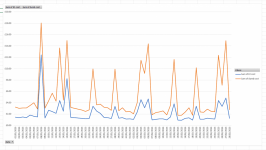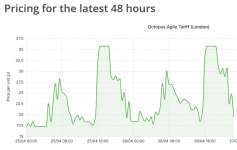- Messages
- 115,214
- Name
- The real Chris
- Edit My Images
- No
Its rather like Godwin's law I wonder what this one could be called.?On to conspiracy theory now?
Oh and I do love a good one
Its rather like Godwin's law I wonder what this one could be called.?On to conspiracy theory now?

What they mean is it will save THEM money, my supplier is getting ever more annoying with emails and texts trying to get me to take a smart meter.The adverts telling me a smart meter will save me energy /money baffle me surely they are misleading ! If I use a 100 watt light bulb for an hour will it only use as much as a 75 watt light bulb if I have a smart meter fitted ?
Rant over , what do you think of them ?
The adverts telling me a smart meter will save me energy /money baffle me surely they are misleading ! If I use a 100 watt light bulb for an hour will it only use as much as a 75 watt light bulb if I have a smart meter fitted ?
Rant over , what do you think of them ?

I find myself thinking that those people who write about how wonderful smart meters are and who, sometimes, become aggressive towards others who hold a contradictory view, is that they're displaying disconfirmed expectancy (click the link for more information).What they mean is it will save THEM money, my supplier is getting ever more annoying with emails and texts trying to get me to take a smart meter.

I think a brief summary would beI find myself thinking that those people who write about how wonderful smart meters are and who, sometimes, become aggressive towards others who hold a contradictory view, is that they're displaying disconfirmed expectancy (click the link for more information).
The evidence suggests that smart meters may help with some peoples' budgeting but they need to be living in the right sort of house, have the ability to both understand and control energy budgeting and be dealing with a supplier that is genuinely going to meet their expectations. What seems to be the general situation is that most people cannot control their use of energy beyond a tiny and probably irrelevant amount.
The smart meter rollout was sponsored by Energy Minister Richard Harrington, who was made a life peer in 2022, just as the stupidities of the system were becoming clear to everyone except the government. To be fair, Harrington is not entirely stupid; his opposition to Brexit and his work for Ukrainian refugees seems to show that he has a brain. In this particular case, however, we can only assume his brain had taken a holiday, without telling him!
My reasons include...Do you have other reasons for not wanting one?

A friend of mine in his mid 70's had a letter saying he was in the vulnerable group and they would do everything to help him out in this cost of living crisis, the following week he went shopping only to return to find he had no electric, He had no clue what had happened so after checking everything else he went for the main switch located i n the outside meter cupboard. At this point he found that it was a different meter and had no understanding about it, there was a small sticker saying if there was a problem with the meter phone 089979089XXXX which he did , The phone number was not in use , I tried this multiple times as did he from different phone networks just in case there was some sort of gremlin between networks. He knows nothing about the internet or technology so had to spend 3 days with out electric which meant he could not cook. Luckily he had a wood burner as temps were in the minus at the time. As we live in a great area neighbors made him food and made sure he was alright. He was lucky as a hell of a lot of places this would not have happened. He was later cut off multiple times as he didn't understand how to use it. Previous to this he had never had a problem and always paid his bills. It really knocked him for six affecting his mental health for a good while. mean while they could give a stuff. I have heard lots of other horror stories but as they were in the papers /on TV or with other people I don't know too well I cannot confirm them.Do you have other reasons for not wanting one?
In my case however, for fire safety reasons we will not run any of the above machines overnight
We had a short circuit in the wiring on a dishwasher which we caught just in time; a family friend had their kitchen & utility room destroyed by a tumble dryer fire so we are a lot more cautious too. We never leave any appliances apart from fridge & freezer turned on if we go out or go to bed.That make total sense to me ! I go round at the end of the night making sure everything is switched off after a Lady I know had her house catch fire while they were sleeping due to a faulty appliance ( in this case a fridge so awkward to turn off). They very narrowly escaped with their lives and she now has major anxiety issues in her house at night and suffers serious sleep problems (she moved after the fire because of this which didn't really help) So I think your comment is a serious one to make.
I find your reasons completely contradictory:
- Don't fix what ain't broke.
- ...
- I really don't want people installing things in my home unless I really want those things.
- If cheaper tarrifs are available to some customers they should be available to all customers - without reference to the customer's time of use.
My reasons include...
- Don't fix what ain't broke.
- Never assume that the first or even the third version of a new technology will work as intended.
- I really don't want people installing things in my home unless I really want those things.
- If cheaper tarrifs are available to some customers they should be available to all customers - without reference to the customer's time of use.
- Anything that makes the privatised companies' lives more difficult seems like a good idea to me.

That's a great idea and may help win over some people. However, I don't think it's possible to do this accurately. A smart meter doesn't just provide you with the data, it provides the energy supplier with the data. With an old fashioned meter they can't tell when you used power so can't work out what they would have charged.At no time previously have advantages tariffs been mentioned to me, if I could save money by having one fitted and not changing much I might consider one, so then electricity suppliers maybe should send out quotes, with and without ‘smart meters’ and best tariffs, seeing savings in £s might help persuade folk?
We have swapped our light bulbs for LED, use a microwave oven as well as a gas hob & oven. & we have 'smart' heating controls, double glazing, plus cavity & loft insulation too, meaning there's little scope for further energy savings.
So a smart meter offers no immediate benefit to me. I can easily cope with photographing my meters once a month & reporting their readings online.


More of this strange language.We won't ever divert from our mission, but due to continued market volatility and the beta nature of this smart tariff we may need to restrict daily sign ups.

Years ago someone I knew wrote a software program for a laugh which was designed to generate 'corporate' phrases not dissimilar to the one above.......More of this strange language.
I tried running it through a translator, which threw a fit and finally came up with "We want you idiots to give us extra money for pretty well nothing but if too many of you fall for this, some of you will start to see through our scam and we can't be having that, can we?"

Octopus are very clear how to best take advantage of this tariff. They are also very up-front about downside of the tariff (may get up to £1/kWh at peak times).This tariff is best suited to customers who can shift large amounts of their energy use to avoid these expensive peaks, often by using smart home technologies like solar and batteries.
More of this strange language.
I agree, I have no issue with Octopus or the information they provide to customers. Should we ever decide to buy an EV I will look again at tariffs & see if there is any benefit to having a smart meter. Octopus Agile remains of interest to me, but not for now. If energy prices ever get back to to the level they were a couple of years ago it might be worth revisiting.Octopus are very clear how to best take advantage of this tariff. They are also very up-front about downside of the tariff (may get up to £1/kWh at peak times).
I cannot see how any of that can be viewed as a scam in any shape or form.
Unfortunately that rules out a hell of a lot of people !For a 10 kWh consumption house, it only takes 5 years to get ROI on battery install (£5000 battery install cost).
With that sort of lingo you should run for Goverment !It's just the same sort of language as these:
1. Single-handedly, I managed managed the successful upgrade and deployment of a new environmental illumination system with zero-cost overruns and zero safety incidents.
Or 'I changed a light bulb.'
2. I've completed the aqua thermal treatment of ceramics, steel and aluminium under a constrained environment.
Or 'I did the washing up.'
As soon as you start insulting people you've lost the argument !
Which part? The £5000 up front cost? or 5 years wait for return on investment? or 10 kWh average daily consumption doesn't apply to people?Unfortunately that rules out a hell of a lot of people !
Unfortunately most people or at least working people don't really have a choice when they use electricity so a hell of a lot of people could end up on this £1 a unit tariff should it happen.They are also very up-front about downside of the tariff (may get up to £1/kWh at peak times)
A hell of a lot of people live hand to mouth so asking them for £5000 is just as daft as asking them for £100,000,000. If they cannot afford the Energy bills as they are and are choosing between Food or heat where they going to magic £5000 from .Which part? The £5000 up front cost? or 5 years wait for return on investment? or 10 kWh average daily consumption doesn't apply to people?
It is sign-up by choice. If some people find it hard to move high consumables away from peak times then don't switch to it.Unfortunately most people or at least working people don't really have a choice when they use electricity so a hell of a lot of people could end up on this £1 a unit tariff should it happen.
In my case I could take the risk of running electrical equipment at night but as I live at least 10 miles from the nearest fire Station down small country roads the risk to me and my family although low in reality is still far too high.

That is true, and with interest rates going up and up, it's difficult to justify a loan.A hell of a lot of people live hand to mouth so asking them for £5000 is just as daft as asking them for £100,000,000. If they cannot afford the Energy bills as they are and are choosing between Food or heat where they going to magic £5000 from .
My bold. I'm not sure if you were referring to fuel duty PLUS VAT or just fuel duty.There are various problems with the way electric cars were introduced to the UK.
The first was the "rich man's bribe" that the government offered to purchasers of electric cars: 35% or up to £5,000, The second was allowing owners to charge the vehicle from their home supply, without paying the equivalent of fuel duty. The third was the zero vehicle excise duty. Given the relatively short predicted battery lives for fully electrical vehicles, there will probably be a very limited second hand market for years to come, preventing poorer drivers from using the technology and keeping them in thrall to the duty on petrol.
Yes they do, and I've made reference to it a couple of times in the past.Someone,I can't find the post, it's a long thread now, wondered if the energy companies have financial penalties imposed on them for not reaching targets
I would 100% agree with your statement, A friend of mine a electrical/electronic design Engineer 20 years ago looked into it using economy 7 to charge batteries of the day ( Submarine batteries as I remember ) He worked out loses both ways ( charging and drawing from the batteries) and reckoned it was worth it then. He did say how long it would take to recuperate the cost but I cannot remember. Now days it must be all the easier with the better battery technology.But no denying localised storage is one of the solution to get cheaper energy. It just cannot be easily put into practice by everyone right now.
That made me think so I had a look. Now the only things I have running between 23:30 and 05:30 are the fridge/freezer and the sky box and I admit I haven't worked but at 7.5p per kWh for those times and 38.74p per kWh between 05:30 and 23:30 compared to 32.56p per kWh on flexible octopus I doubt I would save much if anything without either a serious change in my living routine or a serious investment in batteries. Now for some with a much higher night-time usage it maybe advantages but not for me.Here you go.
View attachment 387284
That's my electricity cost by day for January and February. The blue line is what I paid including standing charge and totals £128.71. That's on Intelligent Octopus which I believe is the best tariff for me for those 2 months and the one I actually used. The orange line is what I would have paid if I had been on Flexible Octopus 2022 v1 which as far as I can see is the best tariff that Octopus would offer me if I didn't have a smart meter. The total would have been £292.39. So having a smart meter allowed me access to a tariff that saved me c£85 a month. (It's worth noting that I have an electric car which is what causes the spikes but every single day the orange line is higher than the blue no matter how much I use)
I have used the currently quotes Flexible price - in practice it can vary according to the wholesale market but I don't have historical values - I don't believe the rate was significantly less in Jan/Feb than it is now. In other news, Octopus just cut my overnight cost by 25% and daytime by 7%. I don't know if they are doing that for Flexible but if they are, that will already be priced in - i.e. I think Flexible would be worse than these figures.
E7 on flexible would have been a lot closer - total for 2 months would be £186 so only £28 a month worse but I don't know if you can get an E7 meter fitted if you don't have one without getting a smart meter.
I think the original one was the Honeywell Buzz-phrase Generator (who remembers Honeywell? Maker of some pretty decent minicomputers back in the 60'/70's).Years ago someone I knew wrote a software program for a laugh which was designed to generate 'corporate' phrases not dissimilar to the one above.......
Yes. If your overnight consumption is low and you plan to keep it that way then time based plans will almost always be more expensive than flat rates. Personally I've managed to shift practically all my mains usage to the night time (via batteries and solar which cost a lot of money) which gets me access to extremely cheap power.That made me think so I had a look. Now the only things I have running between 23:30 and 05:30 are the fridge/freezer and the sky box and I admit I haven't worked but at 7.5p per kWh for those times and 38.74p per kWh between 05:30 and 23:30 compared to 32.56p per kWh on flexible octopus I doubt I would save much if anything without either a serious change in my living routine or a serious investment in batteries. Now for some with a much higher night-time usage it maybe advantages but not for me.
